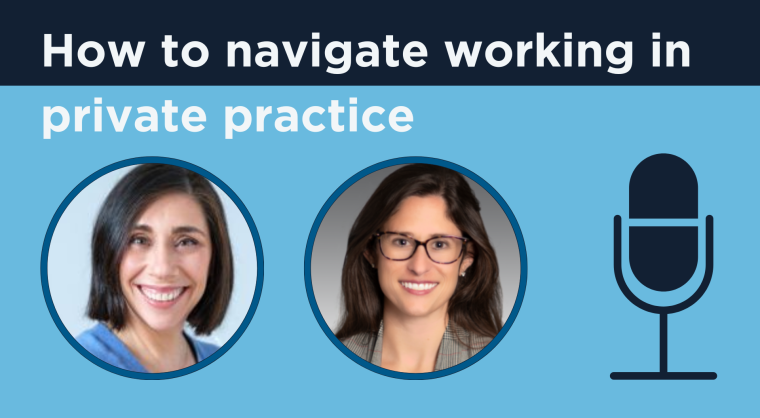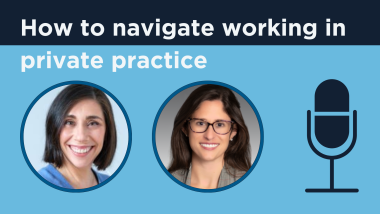In the newest episode of Small Talk, Big Topics, hosts Drs. Matthew Whitson and Nina Nandy are joined by Drs. Jessica Korman and Erica Cohen, gastroenterologists from Capital Digestive Care, a gastroenterology group located in the Washington, D.C.-area to discuss working in private practice, including managing challenging cases.
To start the episode, Drs. Korman and Cohen introduce themselves. Dr. Korman is a clinical gastroenterologist who has been in practice for 11 years. She completed her training at Mount Sinai School of Medicine in New York and specializes is in anal cancer screening and prevention, high resolution anoscopy, IBS and general gastroenterology. Dr. Cohen completed her training at Cedars Sinai Medical Center in Los Angeles, California. She came to Capital Digestive Care to focus on IBS in the clinical trial program and the development of an IBD program in the community. Her work includes general gastroenterology and complex IBS patients.
Both guests share why they decided to move from traditional academic medical centers to private practice. Dr. Korman cited that avoiding bureaucracy was a major draw for private practice while Dr. Cohen reflected on the positive communication fostered among the different groups of doctors in Capital Digestive Care. Private practice also offers GI professionals the opportunity to raise the bar of care within their own community. It is one of the best areas to be in if you want to generate a direct impact for others. With this impact, however, come expectations for providers to be readily available for patients. It all comes down to finding the appropriate balance between responsiveness and expectations.
They also identify the most important skills they learned during training which have proven beneficial in private practice. One example Dr. Cohen offered is when patients research their condition before coming into the office. In that situation, providers should offer them with an algorithm catered to patient needs. From there, providers should offer the patient a short term and long-term goal and encourage them to reach out in 2-3 weeks to see how the condition has progressed. No matter how educated patients are, they will want to hear what providers think about their condition and personalized recommendations. Dr. Cohen similarly likes to offer patients a roadmap to find out what might work for them. Patient portals serve as a method for regular check-ins with patients since it’s difficult for providers to see every patient every 2-3 weeks in person.
The guests also discuss how clinical medicine is all about shared decision making. Patients don’t want a provider to force something on them, but rather want to feel that they are directly involved in their treatment plan. The first step is understanding patient expectations and whether or not providers can meet them. Sometimes, patient and doctor relationships just clearly aren’t working. Although it can be so easy for providers to take customer dissatisfaction personally, both Drs. Korman and Cohen agree that if a service relationship isn’t working, it isn’t personal. Mentorship can be so helpful not only for clinical recommendations, but also for providing support for social, emotional and access issues.
The conversations shift to discussing how to navigate all of the collaborations necessary for a successful practice. Dr. Cohen offers a look into her own weekly schedule: one day of telehealth, 1-2 days of scoping , 1-2 days of in person clinic and one admin and research day. She also scopes at the local hospital for patients who can’t come to the endoscopy center once a month. For Dr. Korman, she does 1-1.5 days of colonoscopy and endoscopy in the patient center, 1.5 or 2 days of high-resolution anoscopy and the rest of her week is with in-office patients.
They wrap up the episode by sharing the most valuable piece of career advice they have received.
Connect with this episode's guests:
Follow Dr. Jessica Korman on Twitter.













